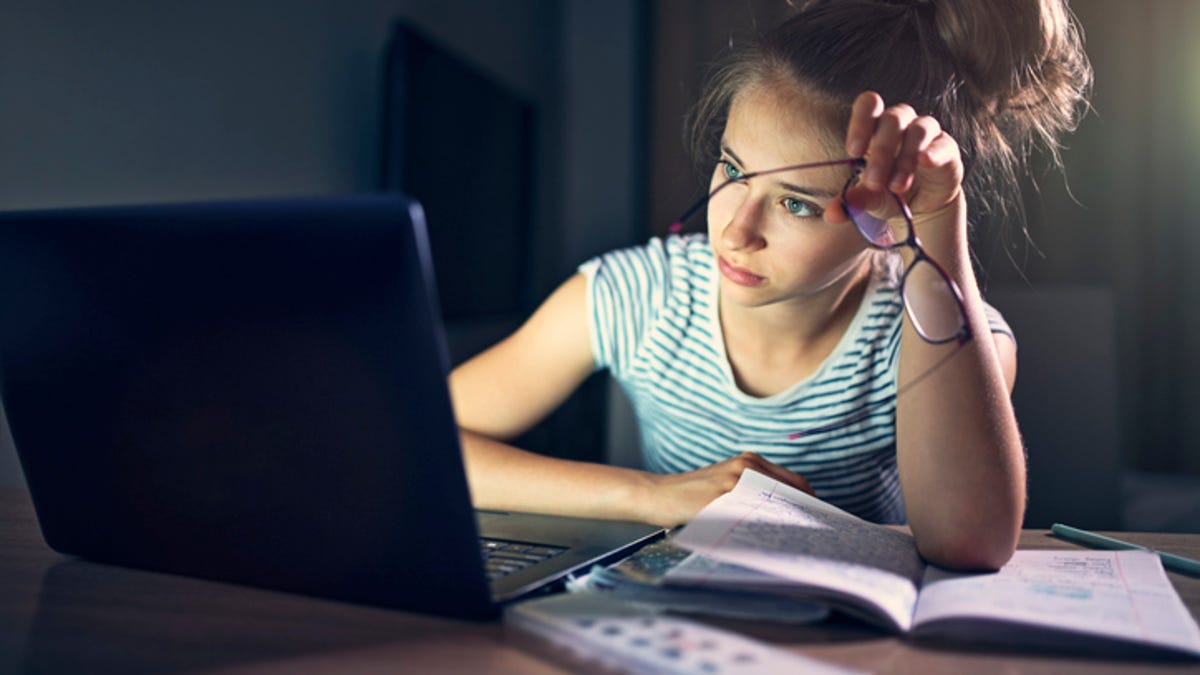3 Ways Pulling an All-Nighter Is Actually Sabotaging Your Performance
Pulling an all-nighter might seem like a good idea to cram for a big test, but it's likely to backfire and hurt your concentration. Here's what to do instead.

I've pulled my fair share of all-nighters, cramming before an exam and hoping that hanging out all night in the library would imprint it on my brain. Unfortunately, like many others, I found that all-nighters didn't help me prepare for my test. By the time I opened the exam, my eyes were heavy, and the only thing I could focus on was crawling into bed.
By the end of college, I was on Team Sleep. I'd sleep a full night, wake up early, get to the library and cram. It worked for me (and my grades). It's not just a personal preference; there are scientific reasons you shouldn't pull an all-nighter before a big test. Let's go through all the reasons you should forget cramming and get some sleep.
While you're at it, find out how to fall asleep in 10 minutes or less and why you shouldn't snooze your alarm in the morning.
1. It impairs your cognitive function
Sleep deprivation impacts your cognitive function by affecting your memory, ability to concentrate and your problem-solving skills. Put simply, you're not at your best after staying up all night, which means it's the worst time to take a test. When you're sleep-deprived, your attention span and ability to concentrate are decreased.
All-nighters backfire most significantly when it comes to memory. Our memory is split into three categories -- sensory, short-term and long-term memory. For memories to move through the stages, there has to be consolidation and recall, meaning it has to be stored in the brain and you have to be able to remember it. Memory consolidation happens when we're asleep. If you're staying up and not getting enough sleep, your memories will never get to this crucial stage, and you won't be able to recall them.
So while an all-nighter might seem like a good idea, it doesn't pay off. You'll have a tougher time forming and retaining memories -- in other words, the information you're cramming, when you're sleep deprived.
2. You won't be as alert
This shouldn't come as a surprise, but you'll be more tired the next day when you stay up all night. But it's not a normal type of sleepiness; fatigue affects your alertness. When you're sleep-deprived, a fog hangs over you that slows your thoughts and lowers your alertness. Your ability to think logically and perform tasks is impaired. You're not as good at taking tests if you haven't gotten any sleep.
3. Increases anxiety symptoms
Big tests are stressful; there's no way to avoid that. Not getting enough sleep can amplify anxiety symptoms, ultimately hindering your performance. Without sleep, you start to feel distressed more easily because the prefrontal cortex isn't able to control how the amygdala interprets anxiety as well. The amygdala is where your emotions and fear response takes place. When it's running unchecked, you'll feel more fear and anxiety.
Read more: Anxious at Night? Use These Tips to Calm Anxiety and Sleep Well
How to get better sleep before a big test
Instead of cramming all night, it's best to prioritize your sleep so you're at peak performance the next day. Sometimes, with a packed schedule and stress, that's not so easy. Use these simple tips to get the best sleep before your test:
- Set an alarm: This one is sometimes easier said than done, but you must prioritize a full night's sleep. It's a good idea to set alarms to remind yourself to start getting ready for bed so you don't accidentally stay up too late.
- Drink tea for sleep: If you're restless before bed, a good way to relax is with a cup of herbal tea for sleep -- try chamomile, valerian root or magnolia tee. Drink it at least an hour or two before bed for maximum relaxation.
- Add yoga stretches to your nightly routine: Your nightly routine should be packed with relaxing activities. For some, it's reading or taking a bubble bath. For others, it may be yoga. Popular yoga poses before bed include the cat-cow pose, forward fold and happy baby.
- Put away your devices: So many of us open social media when we crawl into bed, but it's detrimental to our sleeping habits. The blue light from your phone and TV suppresses melatonin production in your body so you don't feel as tired.
- Put on a sleep playlist: If you're someone who needs some sort of noise to fall asleep, try music instead. But not just any music will do: You want to avoid anything that gets you too excited. Think slow jams or instrumental music.
If you're still having trouble falling asleep, use these tips to fall asleep fast and learn how to get the most out of the sleep you're getting.

